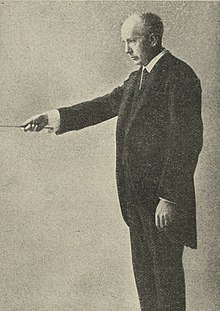
Music in Nazi Germany, like all cultural activities in the regime, was controlled and "co-ordinated" (Gleichschaltung) by various entities of the state and the Nazi Party, with Propaganda Minister Joseph Goebbels and the prominent Nazi theorist Alfred Rosenberg playing leading – and competing – roles. The primary concerns of these organizations was to exclude Jewish composers and musicians from publishing and performing music, and to prevent the public exhibition of music considered to be "Jewish", "anti-German", or otherwise "degenerate", while at the same time promoting the work of favored "Germanic" composers, such as Richard Wagner, Ludwig van Beethoven and Anton Bruckner. These works were believed to be positive contributions to the Volksgemeinschaft, or German folk community.
The Nazis promoted Aryan ideologies through heavy censorship and cultural control, blacklisting Jewish compositions, banning specific concert hall performances, and controlling radio content in order to promote nationalism through cultural unity. By controlling the mediums of communication the Reich Chamber of Culture was able to dictate public opinion in regards to musical culture, and reaffirm their hegemonic beliefs, promoting "Aryan" works consistent with Nazi ideology.
Propaganda Minister Joseph Goebbels famously decreed radio to be "the most influential and important intermediary between a spiritual movement and the nation, between the idea and the people".[1] He put much effort into the exploitation of radio technologies and its ability to reach the German populace regardless of their socioeconomic status. To this end, a low-cost "people's receiver" (Volksempfänger) was introduced.